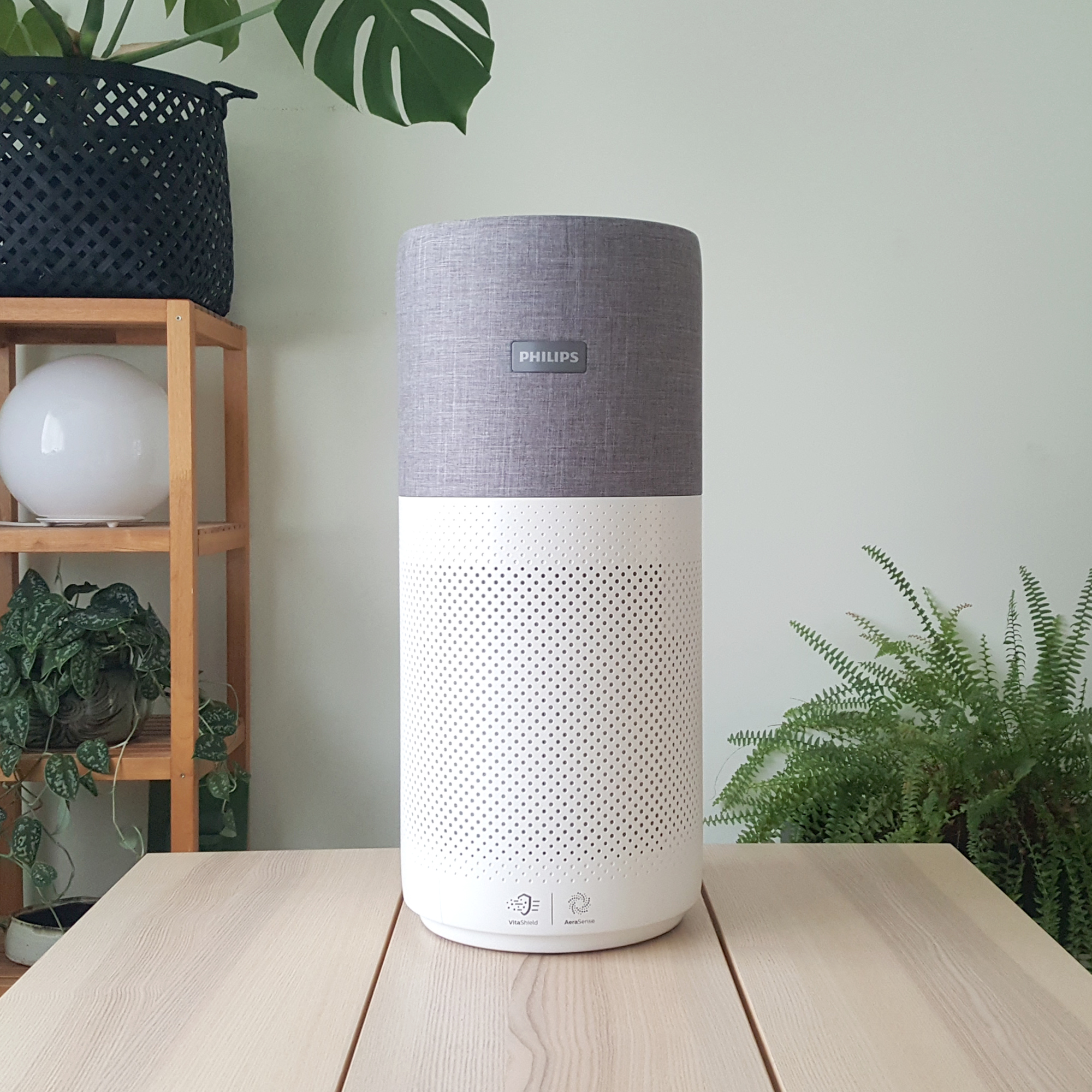
Specifications
How I tested
1. Assembly/set up
2. Design
3. Performance
4. Ease of use
5. Noise levels
6. Portability
7. Energy use
8. Filter replacement
Verdict
Our Philips 3000i Series AC3033/30 Connected Air Purifier review puts one of the most powerful air purifiers on the market through its paces to see how it fares in comparison to the best air purifiers the Ideal Home team has tested.
Philips has a wide range of air purification devices in its roster, but the 3000i Series is the biggest and most powerful of the bunch, with a 520m³/h CADR (clean air delivery rate) and the capability of filtering the air in a space up to 135m².
That makes it a great option for use in large or open plan homes, where its HEPA and active carbon filter promises to make quick work of combatting 99.97% of airborne allergens.
It also features a built-in air quality sensor that gives you real-time readings of your home's Indoor Allergen Index, PM2.5, and gas (meaning VOC and odour) levels and an automatic mode that uses these readings to manage your home's air quality without manual intervention.
Plus, Wi-Fi connectivity means you can view additional air quality data via the Philips Clean Home+ App and allows remote operation of the air purifier, either via a Smart device or by connecting the Philips 3000i Series AC3033/30 Connected Air Purifier to Amazon Alexa or Google Assistant for voice-activated control.
Overall, the 3000i Series has a lot to offer, so I was eager to put it to the test in my own home to see how it compared to the competition.
Philips 3000i Series AC3033/30 Connected Air Purifier review
Specifications
- Recommended room size: 135m²
- CADR: 520m³/h
- Noise levels: 15-56dB
- Filter type: HEPA filter and activated carbon filter
- Dimensions: H64.5 x W29 x D29cm
- Weight: 6.8kg
- Wattage: 2-55W
- Wi-Fi connectivity: Yes
- Timer: Yes
-
Auto mode: Yes
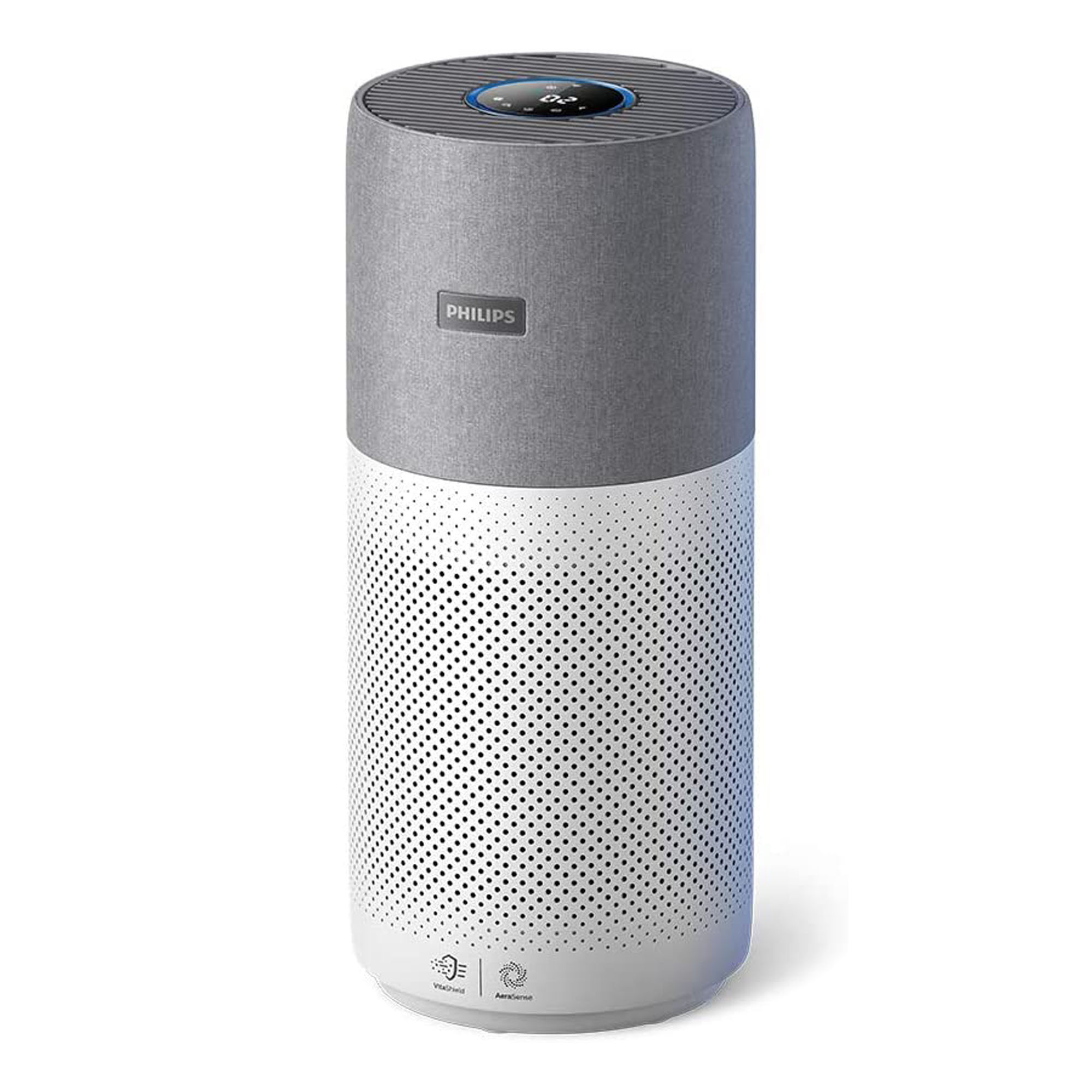
How I tested
Assembly and set up
The Philips Series 3000i Connected AC3033/30 air purifier arrives in a fairly sizeable box, measuring H71 x W35 x D36cm.
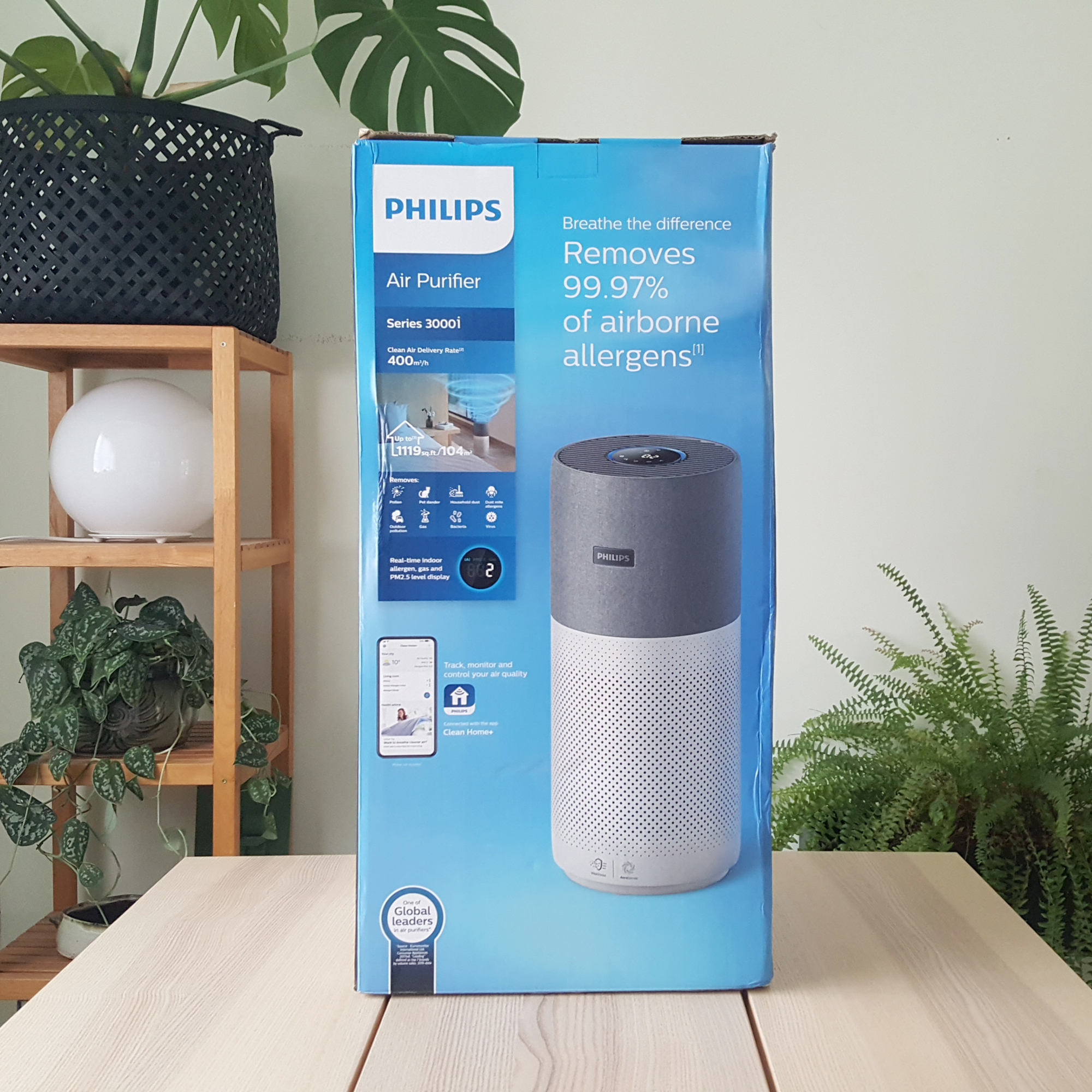
Once unboxed, assembly is fairly minimal, with just the back of the air purifier to remove so you can unpackage the substantial air filter and slide it back into the air purifier's cavity.
Beyond that, all you need to do is connect the Philips Series 3000i Connected AC3033/30 air purifier to your Wi-Fi and download the Philips Clean Home+ App if you want to operate it remotely via your preferred device. You can also connect the Series 3000i to Amazon Alexa or Google Assistant for voice-activated control. However, the Series 3000i can also be operated via the on-board controls if you're not that tech savvy.
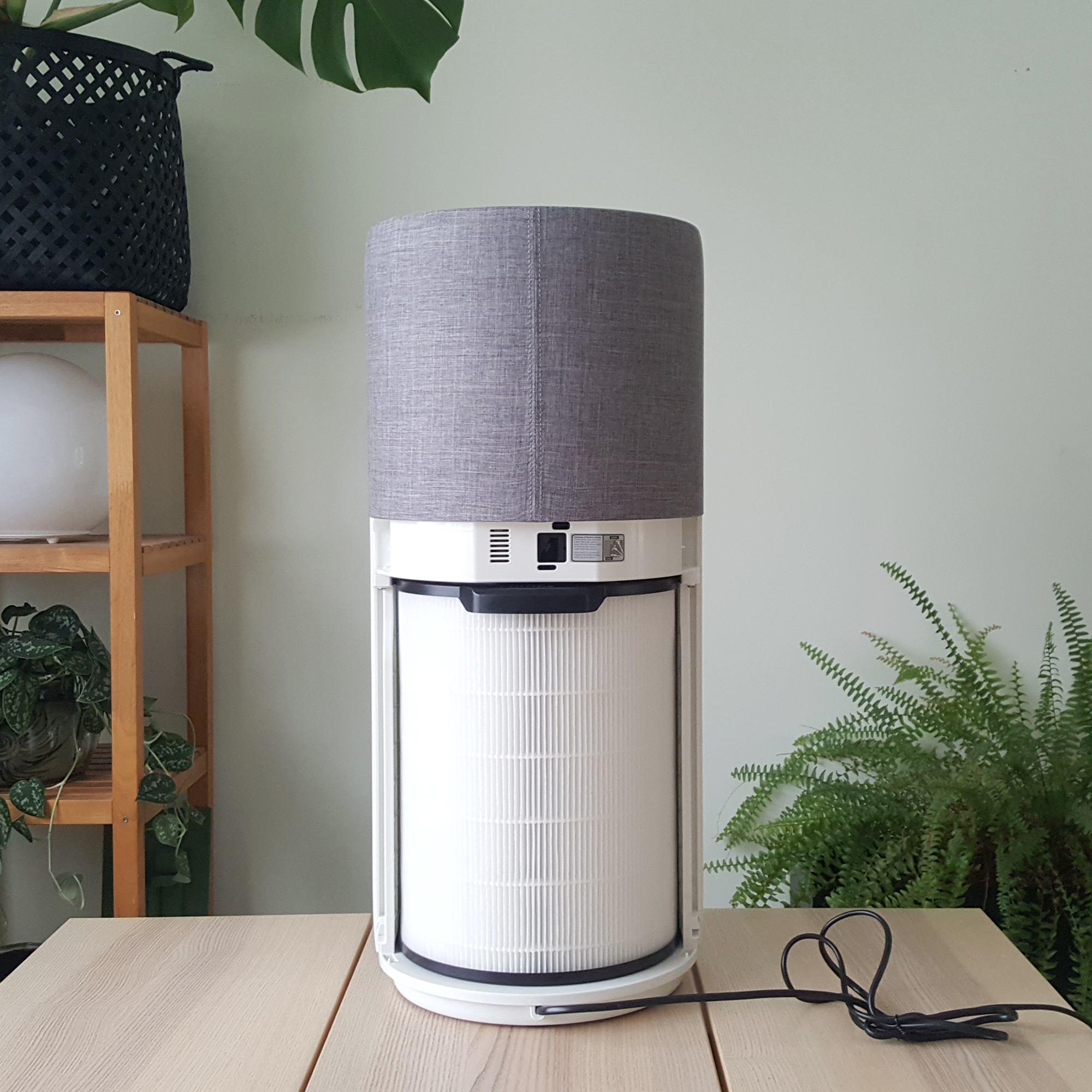
Design
All in all, the Philips Series 3000i Connected AC3033/30 measures H64.5 x W29 x D29cm and weighs in at 6.8kg. Whilst that doesn't make it the largest air purifier I've tested, it does mean it's a model that you'll want to place on the floor rather than a work surface.
Its cylindrical design echoes the shape of most air purifiers on the market, although the fabric-covered upper third is a nice touch that makes it feel a bit less 'appliancey' and a little more like a piece of upholstered furniture, helping it to blend into the home.
Overall, the design is reminiscent of a sound speaker, and it doesn't look too out of place popped in a corner of the room.

The control panel is placed on the top of the air purifier, with a large circular LCD that displays the current IAI level, PM2.5 and gas levels.
As well as a numerical value for each category, the outer edge of the LCD also changes colour to indicate the air quality level, switching from blue for 'good' air quality, through blue-purple for 'fair', purple-red for 'poor', and red for 'very poor' as the air quality drops.
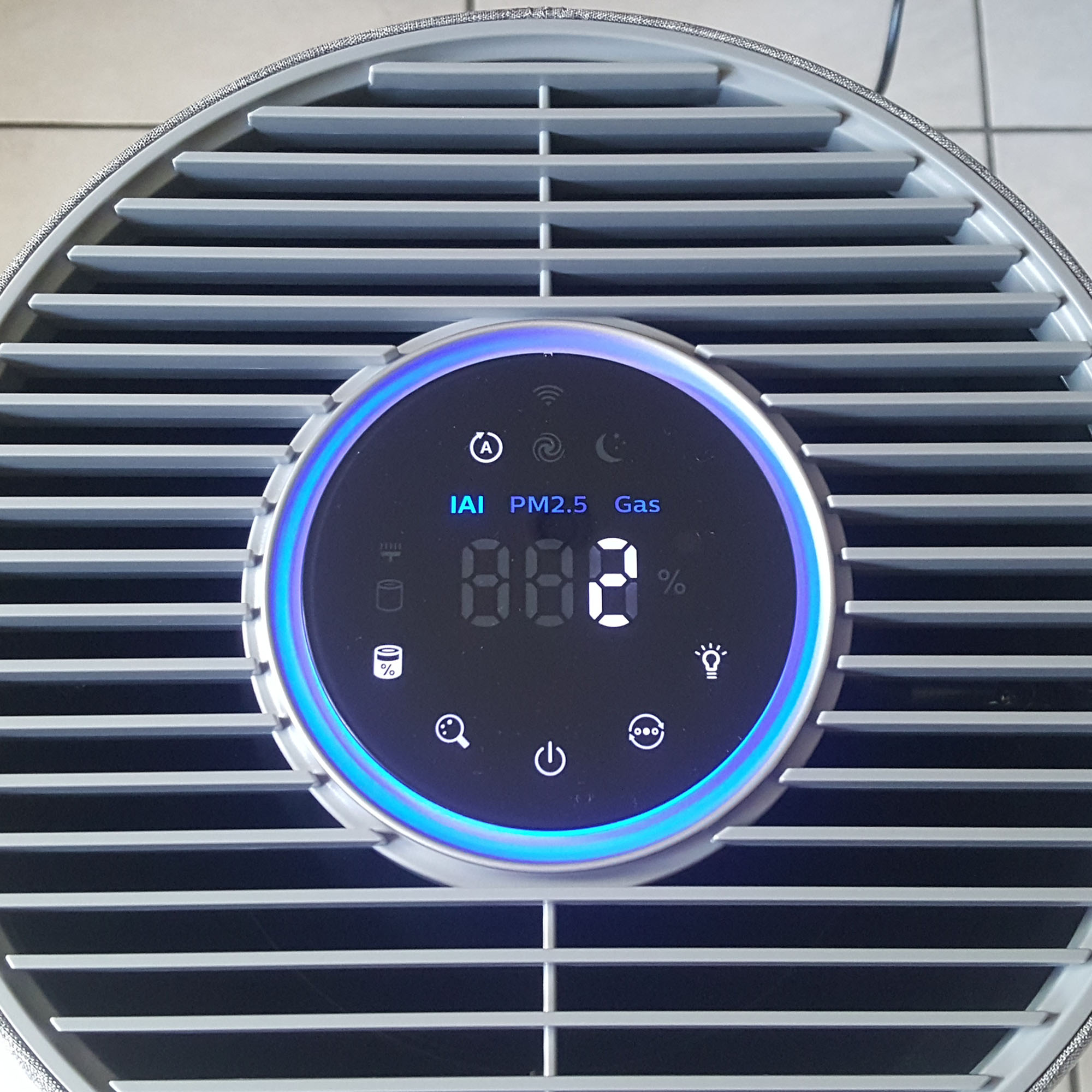
Performance
The Philips 3000i Series can be operated in three modes – Auto, Turbo and Sleep.
In Turbo mode the air purifier operates on its highest fan speed and in Sleep mode it stays on the lowest fan speed for its quietest performance, as well as dimming the lights on the LCD.
In Auto mode the air purifier uses its built-in air quality sensors to adjust the fan speed in accordance with the ambient air quality, switching up a gear should air quality drop and switching back down to standby when air quality is good.
Auto is the mode I put the air purifier into to perform my first test of its filtering powers.
When I first turned the air purifier on, I was pleased to see it register very low levels of pollutants in all three of the available measurements; IAI, PM2.5 and gas.
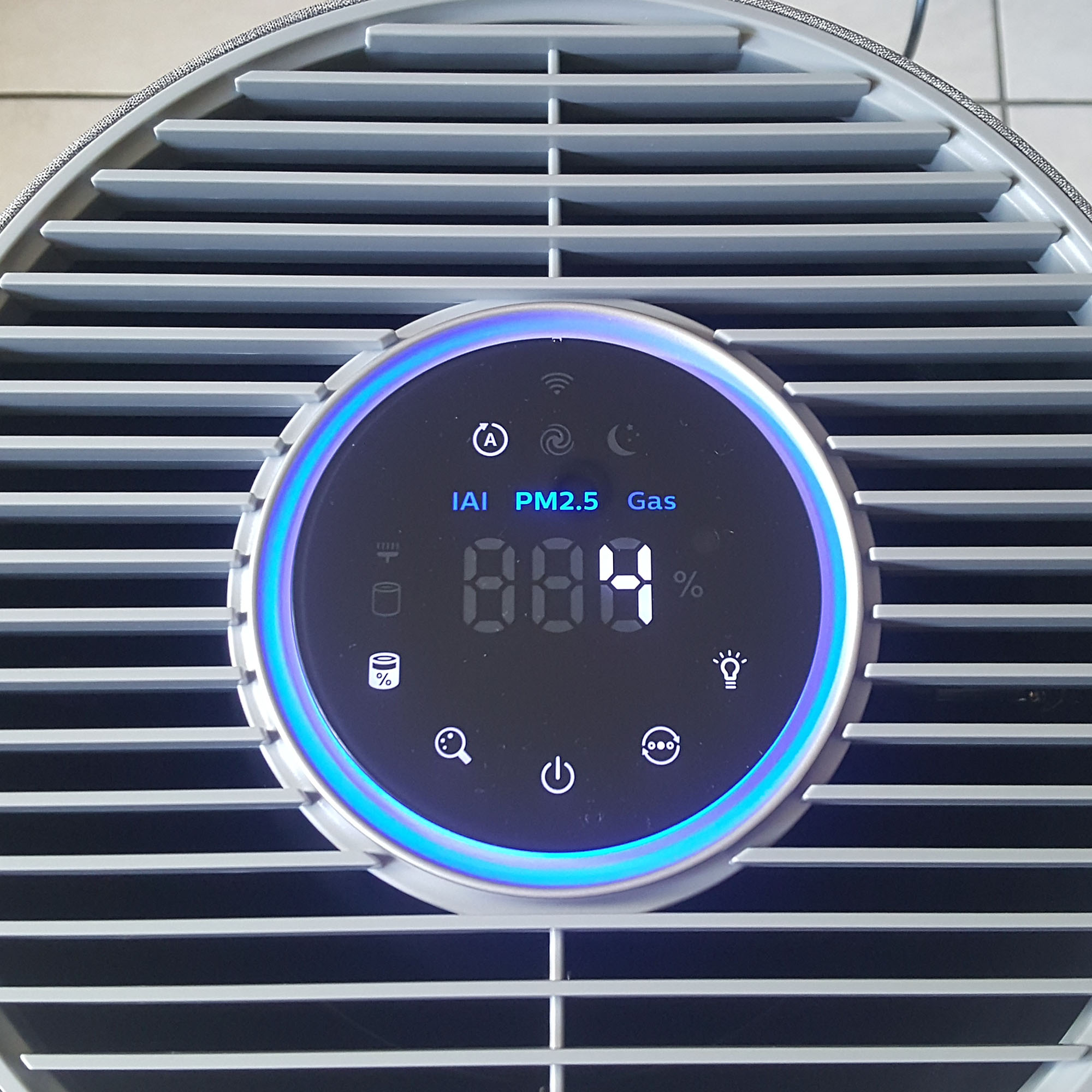
To test out how quickly the Philips 3000i Series AC3033/30 Connected Air Purifier would pick up on changes to the air quality – and remove any offending airborne pollutants – I first lit a match a safe distance from the air purifier and let it burn out to create smoke in the air.
The 3000i Series registered the drop in air quality in a super fast three seconds, and then took 30 seconds to clear the air and return to standby mode.
I performed another test spraying aerosol deodrant in the vicinity of the air purifier to see how quickly it would register the VOCs present, and got the same super speedy results. This time it took the 3000i Series five seconds to register the airborne particulate and just over two minutes to return the air quality back to 'very good'.
Next up it was the cooking fume test. My kitchen has an ancient extractor fan that struggles to adequately remove cooking odours, so seeing if the 3000i Series could outperform it would be a good test of its powers.
I shut the kitchen door, made sure the windows were closed, left the extractor fan off and started frying two rashers of plant-based bacon whilst the Philips 3000i Series was running in Auto mode and positioned a safe distance away.
From when the bacon first started sizzling, it took the 3000i Series another super speedy 40 seconds to register the cooking fumes, at which point the air quality indicator reading began climbing, the display light switched to red, and the fan speed increased in line with the fumes intensifying.
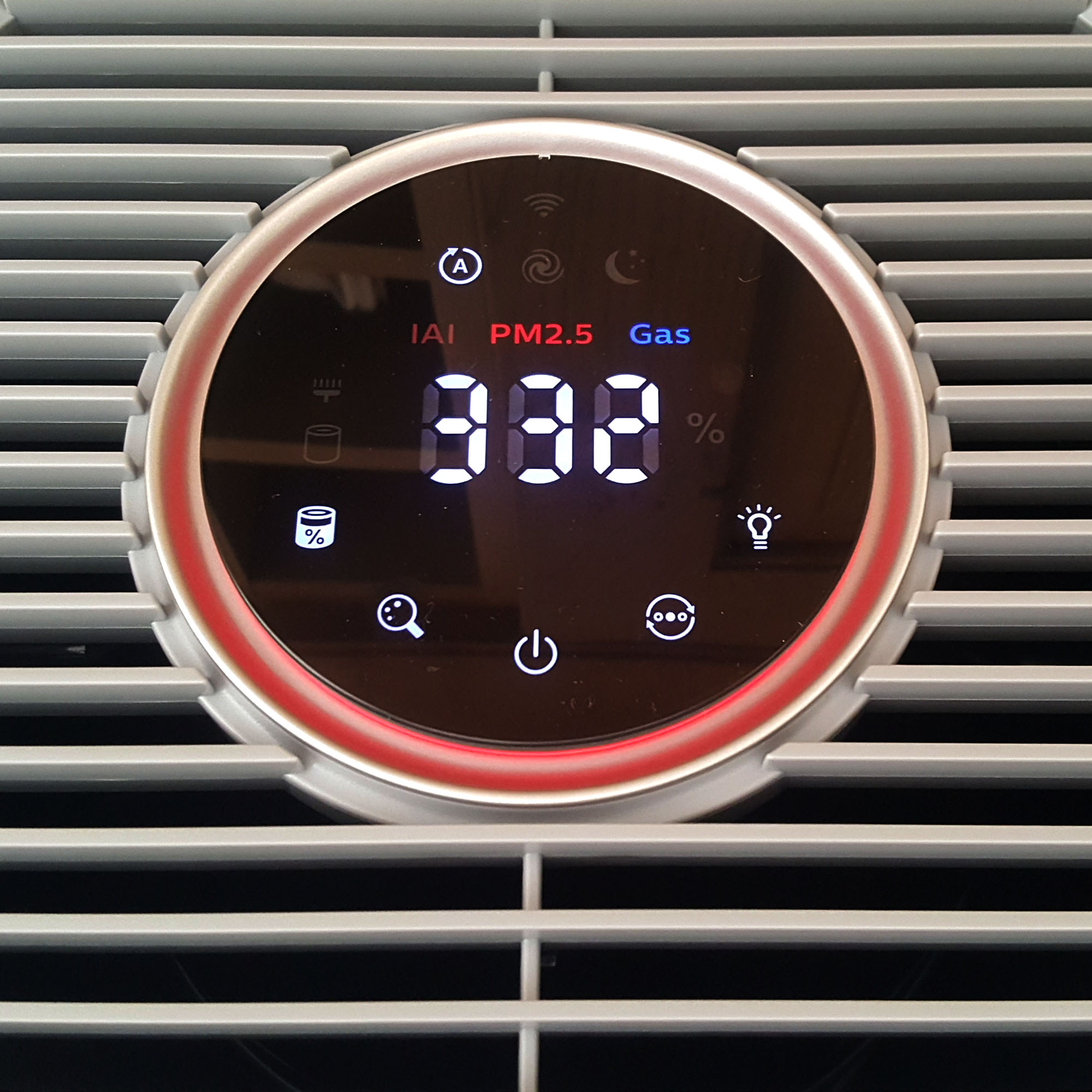
All in all, it took 11 minutes and 21 seconds for the 3000i Series to finish doing its thing, register the air quality as back to 'very good', and return to its lowest standby fan speed setting.
In each of these tests the Philips 3000i Series AC3033/30 Connected air purifier's performance was very impressive with it demonstrating super fast response times to each of the airborne pollutants.
Ease of use
The Philips 3000i Series is also super easy to use. The control panel is very intuitive and the LCD buttons clearly marked and easy to press, and the built-in sensors mean that you can switch into Auto mode and just let the air purifier do its thing.
The 3000i Series also offers more in-depth air quality data than most other air purifiers I've tested, beaten only by the super detailed air quality analysis of the Dyson Purifier Hot+Cool Formaldehyde HP09 Fan Heater.
And I loved how accessible that air quality data was. It just required a quick press of the onboard controls to see a detailed analysis of overall IAI, PM2.5 levels and VOC levels, with the option of even more detailed information within the Philips Clean Home+ App. Although it is worth noting I found some third-party reviews from users that mentioned some people had had problems with connecting to the App.
The coloured air quality display lights are also a nice addition, but having the numbered measurements alongside sets this air purifier apart from most of its competition in this regard.
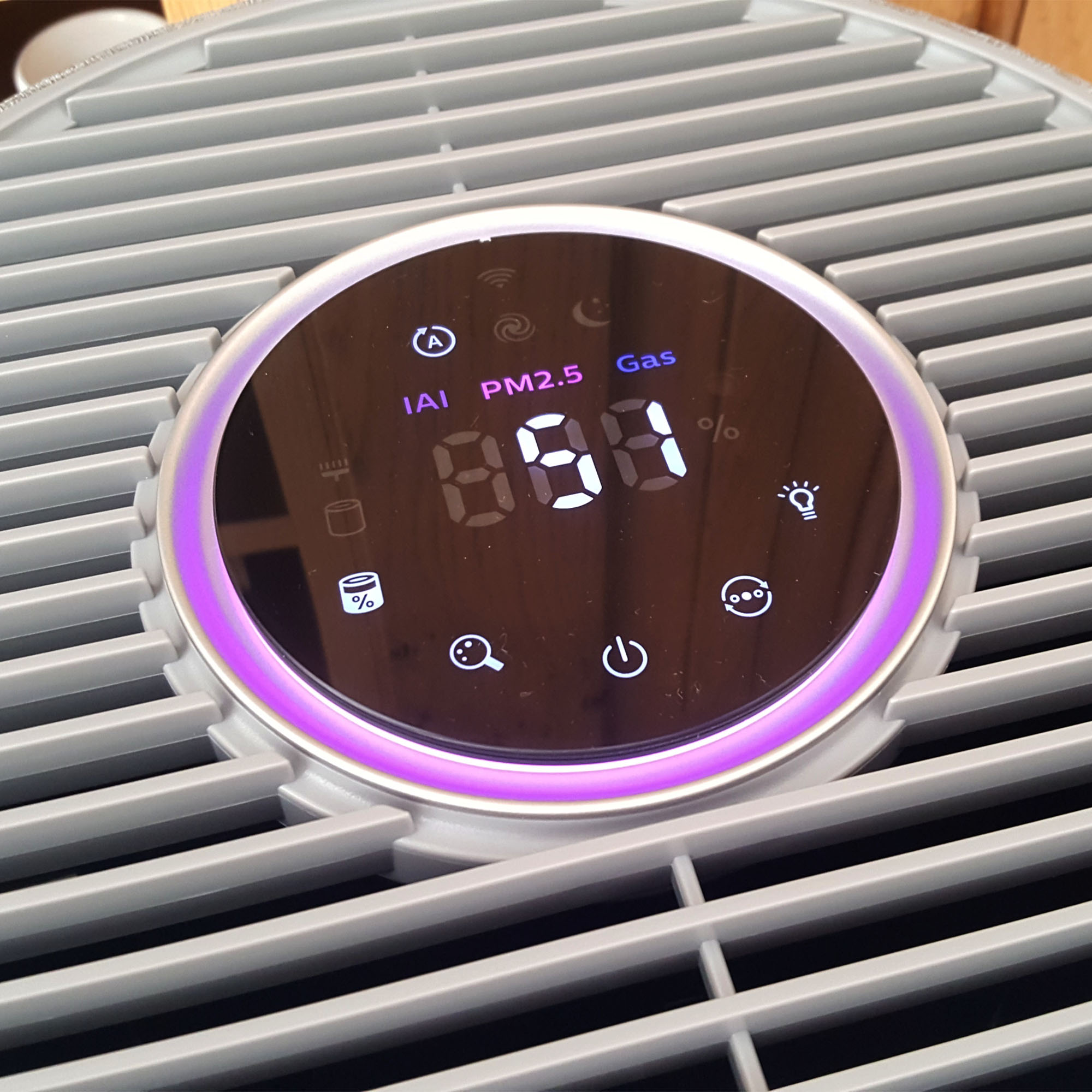
Noise levels
Officially, the noise levels of the Philips 3000i Series AC3033/30 Connected Air Purifier measure between 15-56dB, depending on which mode you have it running in.
The higher the fan speed the noisier the airflow, but it is not often you'd have the air purifier running at full capacity, especially as the 3000i Series is equipped with that Auto mode which drops the fan speed back down to low as soon as any pollutants are filtered from the air.
The 3000i Series' Sleep mode is also a useful touch, meaning you can have the air purifier running overnight to steadily filter the air without any worries about being disturbed by an increase in fan noise.
Portability
Portability is one of the areas where the Philips 3000i Series AC3033/30 Connected Air Purifier could see some improvements.
Although it is fairly weighty at 6.8kg, this wouldn't be too much of an issue if there was an easy way to grip the Series 3000i. But, its large cylindrical design doesn't come equipped with a carry handle, so trying to hold onto its smooth cylindrical body to move it without any handholds can be an issue.
It's not impossible to do, but its manoeuvring would be made much easier with a folding handle built into the design.
Energy use
The Philips 3000i Series AC3033/30 Connected Air Purifier uses between 2-55W of energy depending on which fan speed the appliance is operating in.
That's definitely not as energy efficient as smaller air purifiers that average around 25W, but the 3000i Series' automatic mode does help cut down on running costs meaning you'll rarely need the air purifier on full blast for long.
This energy-saving feature means that you can rely on the 3000i Series' built-in air quality sensor to automatically control the air purifier's performance, so you're never wasting more energy than you need to maintain good air quality.
You can find out more about how much it costs to run an air purifier in our dedicated guide.
Filter replacement
Air filter replacement is an additional cost that it's important to factor into any air purifier purchase.
On average most manufacturers advise that an air filter should be replaced roughly every six months as it will gradually become clogged up with particulate and its efficiency therefore reduced. However, the good news is that Philips suggests the 3000i Series AC3033/30's HEPA filter should only need replacing every three years.
No doubt this guide to replacement frequency will depend on how well you look after the filter, but the 3000i Series comes with a handy cleaning light that illuminates when the filter needs a little TLC, at which point Philips recommends gently cleaning it with a vacuum cleaner.
Another light will illuminate when the filter needs replacing, and handily you can press this at any time to view the filter's 'health' status, whereby a percentage showing the filter's remaining service life is displayed on the LCD screen.
When you do come to replace the filter, it looks like replacements are around £85, as of writing. Not cheap, but not the most expensive I've come across either, especially for an air filter of this high a CADR rating.
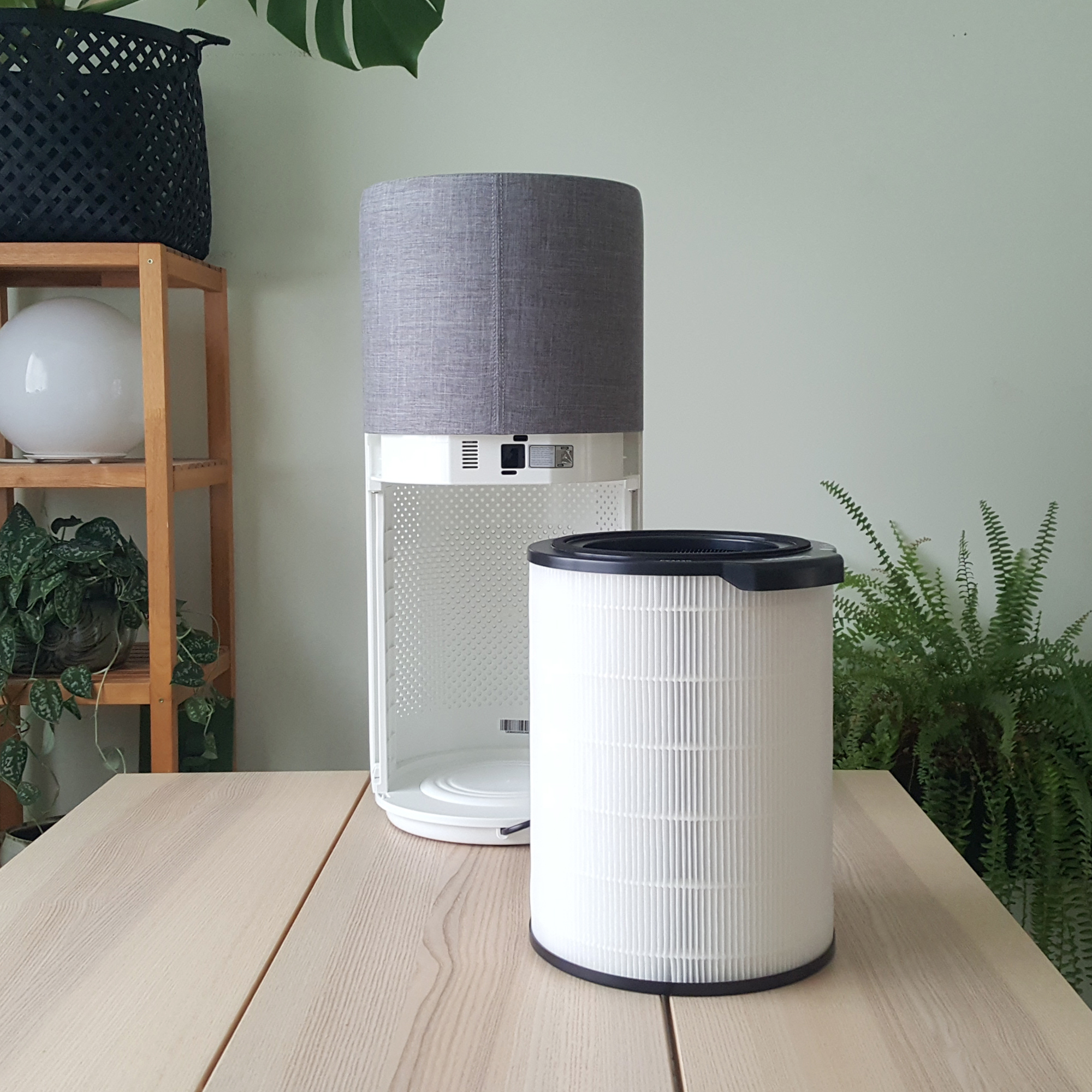
Verdict
Overall, I think the Philips Series 3000i Connected AC3033/30 is a great air purifier. It is an investment, and if you only have a small space to filter then you could save money by opting for a less powerful model – there are plenty of lower CADR Philips air purifiers available – but, if you have a large room or open plan home then this is a great air purifier for bigger spaces.
In all of our tests, the 3000i Series responded fast and effectively, quickly identifying and filtering out a variety of airborne particulates. In fact its performance was on par with our two top-rated air purifiers, the Blueair Blue Max 3250i and AEG AX91-604GY Connected air purifier.
The Blueair Blue Max 3250i air purifier is a lot more affordable but has a lower 239m³/h CADR which means it can only filter the air in a space up to 48m2. So if you have a larger space to purify, then the 3000i Series 520m³/h CADR and 135m² is a better buy.
However, it is just pipped to the post by the AEG AX91-604GY Connected air purifier which offers a super impressive 620m3/h CADR. Thanks to the AX91-604GY's carry handles the AEG is also slightly more portable and easier to move around the home, the AEG model also uses slightly less energy, but both are great options for a larger space.
The easy-to-read air quality data the 3000i Series' provides is also almost unbeaten, with only the Dyson Purifier Hot+Cool Formaldehyde HP09 Fan Heater offering comparable detail. Although the Dyson offers far less powerful air filtration than this Philips model.
All in all, fast response times, powerful HEPA filtration, an easy-to-use design, great air quality data, and Wi-Fi connectivity make the Philips Series 3000i Connected AC3033/30 a great large space air purifier. And, I've often seen it available with significant discounts throughout the year. So keep an eye on our air purifier deals page, and you could snap it up for a bargain price.







